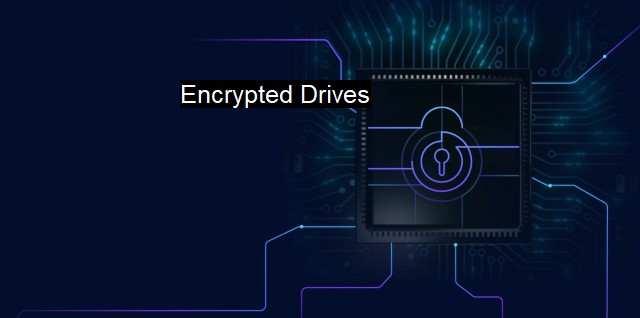What are Encrypted Drives?
How Encrypted Drives Help Protect Your Confidential Data in Today's Cyber Threat Landscape
Encrypted drives play a significant role in cybersecurity and antivirus protection, addressing various concerns related to data privacy, integrity, and accessibility. An encrypted drive refers to a device that employs encryption algorithms to secure and protect information. Let’s delve deeper into the nuances of encrypted drives and their importance in ensuring a security-rich digital ecosystem.When an individual, organization, government agency, or enterprise saves information on any storage medium, they expose the data to a range of security threats like data breaches and malware attacks. This can result in unauthorized access, information manipulation, financial loss, reputation damage, legal liabilities, etc. To minimize these risks, cybersecurity measures are crucial with encrypted drives standing as a cornerstone defense strategy.
Basically, encryption is a process that converts readable data into an unreadable format, or ciphertext, through the application of a series of complex algorithms. Its cornerstone feature lies in the application of intense mathematical langue, thereby concealing information even in the event of unauthorized access. Once the data is encrypted, it can only be unscrambled or decrypted using a decryption cipher or a specific 'key.'
Thus, an encrypted drive involves a storage device in which drive encryption or disk encryption is employed. This can span across various domains such as hard drives, USB drives, SSDs, etc. encryption can be performed on the drive level or volume-level, depending on the need. For instance, full-disk encryption encrypts the entire drive, including the computer’s operating system, application files, and user files. Meanwhile, volume encryption applies to specific data subsets such as file systems or groups of files on a device.
The secure implementation of encrypted drives ensures a robust safeguard mechanism in place against unauthorized access and several other areas of vulnerability. As encrypted drives take up the data’s physical storage, it particularly reduces the risks of offline attacks. It also establishes strong barriers against physical theft, hardware tampering, USB-based exploits, and other hardware-focused attacks.
Incorporation of encrypted drives can play a pivotal role in the antivirus strategy of an organization by defending against malware that tries to access files without legitimate authorizations. Hence, it reinforces the concept of "defense in depth," which statute layered defenses against different kinds of threats along with antivirus measures.
Several standardized encryption algorithms are employed in encrypted drives, including Triple Data Encryption Standard (3DES), Advanced Encryption Standard (AES), RSA, etc. These are reputable for their mathematical complexity and almost impassable nature, thereby providing substantial protection against hacking attempts.
At the same time, key management becomes a significant aspect of managing encrypted drives. The strength, security, and retrievability of the encryption keys directly determine the total protection capability of the encrypted drive. Therefore, best practices such as strong passwords, backups, principle of least privilege, robust authentication mechanisms, and immediate response actions are all fundamental to good key management.
Conclusively, encrypted drives stand as one of the effective ways of securing data from digital threats. As organizations transition to a data-centric world, having a secure hold on digital data is vital. Thus, even as encryption might seem daunting, it offers an additional layer of defense. By combining the protection of encrypted drives with antivirus measures and other cybersecurity best practices, it should paint a comprehensive approach to total cybersecurity protection and management. As the world continues to evolve in terms of technology, the importance of various security measures, including encrypted drives, is borne to increase. It is up to every individual or entity that amass and stores various forms of data to ensure that they adopt a proactive approach towards cybersecurity, taking into consideration the necessary encryption-related technologies.

Encrypted Drives FAQs
What is an encrypted drive?
An encrypted drive is a storage device that has been secured with encryption technology to prevent unauthorized access and protect the sensitive data stored on it from cyberattacks.Why is it important to use encrypted drives?
Using encrypted drives is important because it ensures the confidentiality and integrity of the information stored in them. It prevents unauthorized access, theft or loss of data, and helps protect against cyberattacks.How does encryption protect my data?
Encryption protects your data by converting it into a secret code or cipher that can only be read by someone with the appropriate decryption key or password. This ensures that even if someone gains access to the encrypted data, they won't be able to interpret or make sense of the information without the decryption key.What are the best practices for using encrypted drives?
The best practices for using encrypted drives include using strong passwords and keeping them secure, encrypting the entire drive instead of just individual files, regularly backing up data to a secure location, and using trusted encryption software from reputable vendors. It's also important to keep the encryption software up-to-date and to periodically test the drive's encryption to ensure it's functioning properly.| | A | | | B | | | C | | | D | | | E | | | F | | | G | | | H | | | I | | | J | | | K | | | L | | | M | |
| | N | | | O | | | P | | | Q | | | R | | | S | | | T | | | U | | | V | | | W | | | X | | | Y | | | Z | |
| | 1 | | | 2 | | | 3 | | | 4 | | | 7 | | | 8 | | |||||||